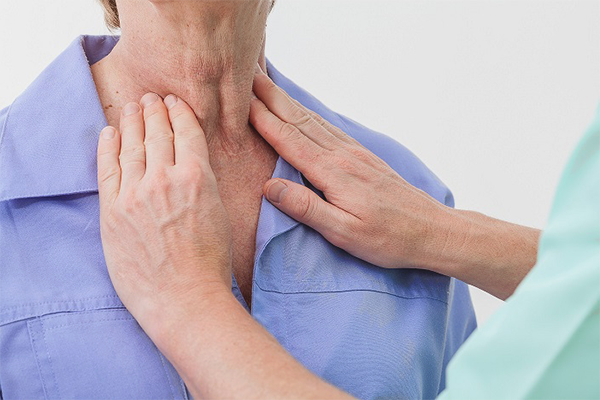The content of the article
Only a doctor should make any diagnosis and prescribe adequate treatment. However, ordinary people without medical education should have minimal knowledge about health and the human body. This is necessary in order to suspect this or that violation in time, consult a specialized physician and not lose precious time. Today we will talk about the thyroid gland - its functions, diseases, symptoms in case of disruption of work, as well as the main ways of treating the thyroid gland.
Thyroid function
The thyroid gland is a small organ in the form of a butterfly, which is located on the front wall of the neck. Despite the fact that the thyroid gland is very small in size, it performs many vital functions. In general, we can say that the thyroid gland is responsible for the production of hormones, which, in turn, fully control the growth, development and condition of the body.So what are the functions of the thyroid gland?
- The thyroid gland affects the psychological and emotional development and growth of a person.
- The metabolic processes of the body are completely dependent on the endocrine system. The thyroid gland is involved in the metabolism of carbohydrates, fats and vitamins, regulates the exchange of calcium and potassium.
- The thyroid gland triggers an important process of puberty in both men and women.
- The endocrine system is actively working in the period of gestation and childbirth - it produces the necessary hormones for the attachment of the ovum in the uterus, promotes the production of milk, etc.
- The thyroid gland has an important effect on the circulatory and digestive systems.
- Another very important function of the thyroid gland is that it is responsible for the work of the immune system. The body, if necessary, begins to produce antibodies that can resist viruses and infections.
- Since the thyroid is responsible for metabolic processes, it can be a cause of weight gain or weight loss.
- In addition, the thyroid gland maintains optimal body temperature, affects cholesterol levels, provides energy metabolism.
Today, thyroid diseases are quite common, especially in women. Early diagnosis can detect pathology in time, receive adequate treatment and change the situation. So what are the symptoms should alert the woman?
Symptoms of thyroid disease in women
Here are some of the symptoms of thyroid disease that should not be ignored.
- Most often, lovely ladies start to panic because of their weight. It is one thing when it is the result of yesterday's overeating, and another when the weight grows or decreases quite rapidly, without any prerequisites for this. A dramatic change in weight without obvious malfunction in nutrition is one of the main signs of thyroid gland malfunction.
- On the diseases of the thyroid gland can tell the mood of a woman. If she is constantly depressed, apathetic, she does not have the time and desire for the usual things - you need to go to an appointment with an endocrinologist. In some cases, the mood, on the contrary, may be too aggressive, nervous, a woman constantly breaks down at work, at home, with children. Often, an excess of hormones leads to excessive tearfulness, the mood changes very quickly and often.
- A woman with a disability in the thyroid gland is difficult to concentrate, her memory and brain activity is reduced - her performance inexorably suffers.
- Because hormone production is impaired, a woman may experience problems with the menstrual cycle. It can lengthen, shorten. Menstruation can be scanty, abundant or even abyss.
- In some cases, there are problems with sleep - there is either insomnia, or, conversely, excessive sleepiness.
- Often, diseases of the thyroid gland are accompanied by disorders of the intestines - there are constipation and diarrhea.
- A woman may have problems in sexual life - in many cases, hormones affect the libido.
- In case of violations of the thyroid gland, the appearance of the woman also changes - the skin becomes dry and peels off, the nails crumble, exfoliate and break, the hair falls out a lot.
- Active sweating, especially during menstruation, can also be a sign of thyroid disease.
- In case of violations of the thyroid, there may be unreasonable muscle pain, trembling in the body, etc.
If you have found similar symptoms in yourself or in your closest women, you should definitely see an endocrinologist. He will prescribe tests for you, diagnose you and prescribe adequate treatment. Pathologies in the functioning of the thyroid gland arise for various reasons. One of the main factors is the heredity - if the parents had problems with the work of the endocrine system, the risk of thyroid disease increases sharply. The region of residence is very important, Russia is a territory of iodine deficiency in water and soil. An important role is played by stress, unfavorable environmental conditions and unbalanced nutrition. But what diseases can the above symptoms indicate?
Thyroid disease
Disorders of the thyroid gland can occur for various reasons. Here are some of the most common diseases of the thyroid gland.
Hyperthyroidism
This is a state of the thyroid gland in which its activity is increased several times. Due to this, the lion's dose of hormones is emitted into the body, which accelerates all metabolic processes.Hyperthyroidism is most often diagnosed in young women. The disease develops as a result of various pathologies of the pituitary gland, glandular formations in the gland, autoimmune diseases, etc. Many of the symptoms of thyroid abnormalities are similar, but there are some differences. When hyperthyroidism is particularly pronounced violations of the central nervous system. A woman becomes irritable, excitable, unbalanced. She can laugh hysterically, and in a minute cry bitter tears. Patients with such a diagnosis very quickly and confusedly talk, lose concentration of thought, they often experience fear and anxiety, a slight trembling in their hands may appear. In case of violation of the production of hormones, various pathologies may appear. Cardiovascular changes are expressed by tachycardia, flickering of a heart rhythm, increase in arterial pressure.
Almost half of patients with hyperthyroidism are characterized by an ophthalmologic disorder, in which the eye slit increases, the eyeball is extended from the orbit. In this case, the mobility of the eyes decreases, the eyelids swell, rarely blink.The vision is also disturbed - the patient sees the objects as forked, there is tearing and pain in the eyes, which can often lead to atrophy of the optic nerve and blindness.
Since the metabolic processes in the body are accelerated, women with a diagnosis of hyperthyroidism may experience increased sweating, weight loss with a background of high appetite. Treatment of hyperthyroidism may be different depending on the characteristics of the course of the disease in a patient. This can be a drug suppression of the activity of the thyroid gland, surgical removal of the gland or its part, as well as treatment with radioactive iodine.
Hypothyroidism
In contrast to the previous diagnosis, hypothyroidism is characterized by insufficient production of thyroid hormones. The reduced function of the thyroid gland is manifested by slower metabolic processes in the body. First of all, this is evident from the obesity of a woman - she is gaining weight, even if she eats moderately and in a balanced way.
Such women seem slow - they slowly think, move, slowly make decisions. Very often, these patients suffer from fatigue and constipation, they are constantly freezing, they have no sexual desire.Among the signs of hypothyroidism can be identified convulsions of the limbs, long and painful menstruation, hoarse voice. It is difficult to diagnose hypothyroidism, since many of the symptoms of a woman are associated with fatigue, overwork, and changes in the quality of life. The peculiarity of hypothyroidism is the absence of characteristic symptoms of the disease. Many of the symptoms can be “tied” to other diagnoses and conditions. Moreover, the severity of symptoms is in no way connected with the lack of hormones in the body. Symptoms may be pronounced with a slight deficiency and may not be noticeable with a serious pathology.
Many doctors may suspect hypothyroidism by the appearance of a person - he has a yellowish and puffy face, which is explained by tissue edema. If you suspect a lack of hormones, the doctor prescribes a blood test to the patient, which will help determine the level of hormones in the body with accuracy.
Thyroid cancer
If you suspect cancer of the thyroid gland, in addition to the main diagnostic measures (blood test, ultrasound, etc.), you need to do a biopsy. For this, part of the thyroid tissue is taken by puncture, histological analysis is done and, based on its results, the decision is made on further treatment tactics. If the thyroid gland is affected, it is removed - partially or completely. You can live without a thyroid gland, but you need to maintain hormone therapy throughout life. Of course, after removal, you need to constantly monitor the endocrinologist and follow his recommendations.
The thyroid gland is a small, but very necessary and important organ that allows you to maintain normal human activity. To protect yourself from diseases of the thyroid gland, you need to comply with preventive measures. It is impossible to take iodine without a doctor's prescription - only according to its prescription. It is better to consume iodine from products - most of it is found in walnuts and cauliflower. Watch your health, go for routine checkups to narrow specialists, and you will be able to recognize the problem on time.
Video: Symptoms and signs of thyroid disease











To send